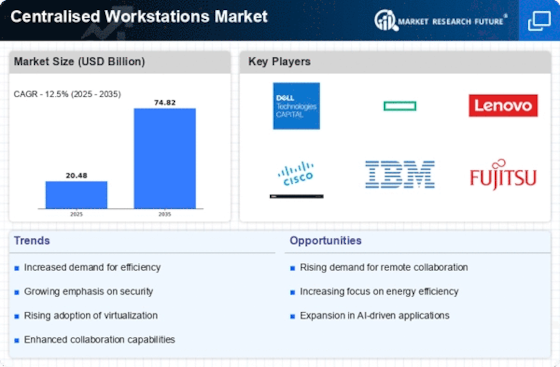Market Analysis
In-depth Analysis of Centralised Workstations Market Industry Landscape
The Centralized Workstations Market grows due to many market factors. Need for centralized registration drives this industry. Centralized workstations enable remote access to high-performance processing and help firms manage their assets. In planning, design, and financing, centralized workstations improve control and coordination.
Centralized Workstations Market focuses on mechanical innovation. Innovations in equipment and systems administration boost centralized workstation performance, design capacity, and network. Centralized workstations for asset-intensive applications and processes are possible with virtualization, GPU performance increase, and productive information transmission protocols.
Global finance impacts centralized workstations. Financial constraints effect IT foundation redesign choices in businesses, schools, and research institutes. Innovative investment, notably on centralized workstations, grows with financial growth to boost efficiency and effectiveness. Financial downturns may mean more conservative IT capital use.
Hub Workstations Administrative consistency and data security are market considerations. Centralized workstation solutions for secure and uniform registration become more crucial as organizations embrace information insurance laws. Companies emphasize administrative measures to secure sensitive data on centralized workstations.
Client tastes and industry trends impact the market. Centralized workstations for remote access and collaboration grow more prevalent as firms implement remote and adaptable work models. The industry welcomes cloud-based centralized workstations and VDI solutions to give end-users productive processing assets.
Centralized workstation reception requires IT interoperability. Companies desire systems that interact with their infrastructure and allow centralized figuring. Complex IT firms choose centralized workstations because they handle several programs, operating systems, and peripherals.
Inventory network considerations impact centralized workstations when firms analyze equipment part procurement and shipment. CPUs, GPUs, and organizing gear impact centralized workstation efficiency. Strong inventory networks help firms satisfy consumer and market demands.
Market considerations include centralized workstations' robustness to catastrophic events and internet security concerns. In difficult situations, associations favor functional coherence and information honesty. Risk-averse companies want centralized workstations for disaster recovery and business continuity.
Work model developments like remote and diverse workplaces can impact markets. Centralized workstations let enterprises register remote groups safely and reliably. Companies that adapt to new work models anticipate current labor requirements.



















Leave a Comment